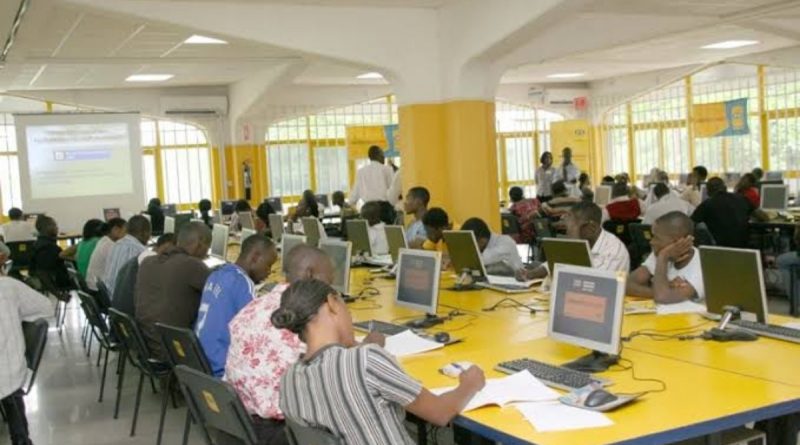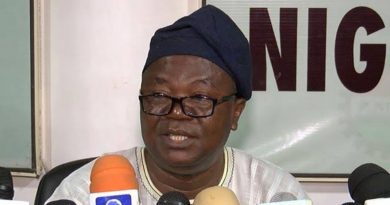How Nigerian students are suffering to attend online classes.
Like many Nigerian undergraduates, 22-year-old Tunde Kore is facing the challenge of unexpectedly switching to online classes due to the COVID-19 pandemic.
The 300-level student of the Lagos State University said online classes are not meant for the poor, especially those in public universities. Mr Kore said he has not attended up to five classes since it started in April.

“The lecturers are the ones organising the online classes via messaging apps. I don’t have a browsing phone, and there is no fixed time for the classes. Most of us are not aware of the online because notice time is very short. Once you enter Whatsapp or Telegram group, you will just see assignments from lecturers,” he said.
From struggling to understand assignments to network connectivity problems, Mr Kore recounts the challenges of online learning. He said his department has finally suspended online classes.
‘Not too rosy’
The coronavirus outbreak has kept schools around the world shut. In Nigeria, authorities closed schools since March 19.
To help students continue with their learning, many schools, from elementary to tertiary, have resorted to online teaching, using platforms such as Whatsapp, Telegram, Google class, and Chrome LMS.
In Nigeria, while this transition has been largely smooth for some private universities and polytechnics, the government owned/public schools ones are grappling to have a hold on the innovation.
ALSO READ: ASUU president is wrong! online classes can work in Nigeria
A student from the College of Management and Social Science at Fountain University Osogbo, Temitope Adeyemo, said online classes are not for Nigerian students, especially the average students.
“We make use of Chrome (LMS) and Google Class for our online classes. Our lecturers can monitor us when they use Chrome LMS, they can see the number of students who log in and out, so students are always serious when we are using chrome LMS, but the lecturers cannot monitor what we do on Google class, so most people do other things by the side and classes are from Tuesday to Friday,” she said.
She said the lecturers are trying their best to make students understand, but it cannot be like physical interaction where we can express ourselves.
Ms Adeyemo said her school would have used Zoom, but it is very expensive. “The data consumption will be too much. Imagine using one Gigabyte of data for a week just for video classes.”
She said there is no motivation in online classes.
Also, a student of Criminology and Psychology from Lancaster University UK, Esther Ayonrinde, said there is a difference being on campus and attending classes online. “While we are on campus, we have access to Wi-Fi, Library and the lecturers will say things in a very clear way.
“There are some books you have access to in the library while on campus, but now you have to buy some of the books online, even with your data,” she said.
Mr Kore from LASU also lamented that he spends between N1,000 and N2,500 per week to attend the classes, and also get some assignments done.
The Lagos State University (LASU)
However, most of the students in the public institutions who spoke to PREMIUM TIMES said access to the internet, good gadgets will continue to be a challenge for online classes, except the government intervenes.
Nigeria is not ready for online lectures or classes because most of the students in public schools are not from rich homes, they said.
It was gathered that students in public and private universities lack free-flow conversations, debates, and discussions during online classes. Technological difficulties and distractions remain challenges of online classes in Nigeria.
Data subscribers
According to the National Communications Commission (NCC), data subscribers in Nigeria rose to 138.3 million in April 2020 from 128.4 million in January 2020. The increase may be connected to the COVID-19 pandemic lockdown.
Despite the increase, some students across public institutions are left out due to low broadband penetration, data cost, and expensive gadgets.
In the context of internet access, broadband is used to mean any high-speed internet access that is always on and faster than dial-up access over traditional analogue services.
In January, NCC announced that $732 million will be released over four years to improve Nigeria’s broadband penetration.
The commission said the allocation will be used to obtain an additional 30,000 kilometres of fibre that will be spread up the internet across the 774 local governments in the country.
ALSO READ: ABU Library Launches Telegram Channel to Assist students
By 2024, when the project is expected to be complete, the total length of fibre across the nation will be 71,000 kilometres. This is projected to increase Nigeria’s broadband penetration from 38 per cent to 65 per cent.
From the introduction of the internet to Nigeria in 1991 through limited e-mail services to this recent development, broadband in Nigeria has endured a daunting journey.
Parents speak
Most parents who spoke with PREMIUM TIMES said the online classes are sapping a lot of data.
Mrs Kore, who is a tailor, said the cost of data or a new phone is expensive for a family struggling to feed.
“I have two children in the universities, and I am still struggling to feed them, then you want me to be buying data again, that is not fair, I tell you. Sales have dropped significantly since the lockdown started and survival is not a joke thing,” she said.
Like Mrs Kore, some other parents, who have their wards in public institutions, said the education sector is not ready for transitioning to online classes.
But Mr Isaac Ayinla said the high data consumption is not limited to students in the tertiary institution. “Apart from settling the ones in the higher institutions for data, we spent a lot of money to buy data ourselves. I spent over N20,000 on data monthly.”
Lecturers react
Lecturers in public universities, who spoke, pleaded anonymity for fear of victimization which may lead to loss of their jobs, said the online classes were organized out of their free will.
“We are not supposed to speak with the media but the online classes were organised to keep the students engaged, we are not getting paid,” they said simultaneously.
Also, a lecturer from Covenant University said online learning is mandatory for private universities as students use the platform to interact with lecturers and submit assignments.
But the vice-chancellor of Oyo State Technical University, Ayo Salami, said the institution had the facilities to teach online before the outbreak of the virus.
“It was very easy for us to activate the online classes because one-on-one teaching became impossible. We encouraged our lecturers to move online so they can continue with their instructions because we really have the learning management system and we have all the hardware and we also subscribe to the software,” he said.
According to him, “the only challenge we had was the connectivity with respect to different locations of our students because all the students are home and there are some places where you have the issue of connectivity so we had to discuss with our students online to look for a good place for connectivity where the network is stable.”
‘Unequal fingers’
The national secretary of Education Rights Campaign, Ibukun Omole, said embracing online classes might mean destroying the already mediocre quality of education obtainable in Nigerian schools. He said it will deny a good percentage of the population who do not have access to the internet and electricity, access to education.
He said the underfunding of public education by the government has made it impossible to give the necessary training to lecturers to make them ready to take online classes.
“So, to provide online classes and ensure no students are left behind because of inability to afford data, poor connection, and irregular power supply, the government will need to take control of the Power and Telecom sectors,” he said.
Also, a public analyst, Gbolahan Olojede, said some of the curricula were not cut out for virtual classes.
“I think the problem is with the fact that fingers are not equal. We cannot assume that all Nigerian students live in Lagos or cities. Some of them their parents live where there is no data, and it is even difficult to (get) mobile signals,” he said.
Similarly, an ICT expert, Randy Aboh, said the easiest way is for every school to develop its management system where the students can record and also download.
By doing so, he said data consumption will be minimal, compared to Zoom or Skype meetings.
Not all universities are equipped
The spokesperson of the National Universities Commission, Ibrahim Yakassai, said a lot of federal universities are not equipped to conduct online learning.
National Universities Commission
He said some institutions may be doing some interactions via WhatsApp, Facebook, and Telegram, but that is not online learning. “Online learning has its style and it takes a lot of expertise to set up the materials.”
Mr Yakassai said the way forward is that when the universities resume, they will do what they are supposed and start the lectures again.
“A call has gone to all higher institutions in Nigeria to explore the possibility of online learning and look at what they require to start online learning in case something like this again. Even if the universities have the capacity for online learning, most of the students don’t have smartphones. The issue is not only about the universities but a national issue, of course, smart universities will explore possibilities,” he said.
- Credit to PREMIUM TIMES
For Advert Placement, Sponsorship, support, Article submission, suggestion, etc, Contact us: info@theabusites.com, +2349015751816 (WhatsApp)








